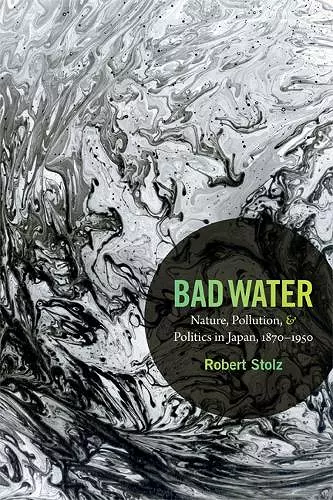Bad Water
Nature, Pollution, and Politics in Japan, 1870-1950
Format:Hardback
Publisher:Duke University Press
Published:4th Apr '14
Currently unavailable, and unfortunately no date known when it will be back

Bad Water is a sophisticated theoretical analysis of Japanese thinkers and activists' efforts to reintegrate the natural environment into Japan's social and political thought in the late nineteenth century and early twentieth. The need to incorporate nature into politics was revealed by a series of large-scale industrial disasters in the 1890s. The Ashio Copper Mine unleashed massive amounts of copper, arsenic, mercury, and other pollutants into surrounding watersheds. Robert Stolz argues that by forcefully demonstrating the mutual penetration of humans and nature, industrial pollution biologically and politically compromised the autonomous liberal subject underlying the political philosophy of the modernizing Meiji state. In the following decades, socialism, anarchism, fascism, and Confucian benevolence and moral economy were marshaled in the search for new theories of a modern political subject and a social organization adequate to the environmental crisis. With detailed considerations of several key environmental activists, including Tanaka Shōzō, Bad Water is a nuanced account of Japan's environmental turn, a historical moment when, for the first time, Japanese thinkers and activists experienced nature as alienated from themselves and were forced to rebuild the connections.
“The author presents important material that is new to environmental history, to intellectual history as well as to studies of Japan. He shows that Japan has a long history of environmental disasters and gives some sense of why this has been so. His individual case studies (Tanaka, Ishikawa and Kurosawa) are well selected. And his conclusions about the limitations of liberal democracy and of liberalism in any form are illuminating, thoughtful accurate and sobering. Nature does not care whether politicians or a majority of the population they lead recognize the greater frequency of extreme weather-including global warming-or not. These things are happening and surely require a far stronger response than any counter-measures that have been proffered up to now.” - James Bartholomew (TLS) "A sound achievement in an area of modern Japanese thought too lightly regarded before now." - Tom Havens (American Historical Review) "Stolz's book gains its special strength from its close intertwining of Marxist theory with the lives of the central protagonists... As this statement suggests, Bad Water successfully stitches together environmental history, a social ecology that predates that of Bookchin, and Marxist theory." - Paul Waley (Journal of Interdisciplinary History) "Stolz brings to his study fresh and important perspectives on familiar events, intellectual trends, and individuals as well as introducing heretofore little-known (but significant) thinkers and narratives to the Western scholarship." - William M. Tsutsui (Pacific Affairs) "Robert Stolz’s Bad Water is an impressive analysis of the history of the interaction between political and ecological thought in modern Japan.... This book is valuable to the study not only of Tanaka and of Japanese environmental problems but also of the history of ideas on the relationships among politics, society, the human body, and nature in a global context." - Yuuki Tomozawa (East Asian Science, Technology and Society) "While Bad Water’s close reading of the Ashio copper mine disaster and the origins of Japan’s environmental movement will appeal to specialists in modern Japan, Stolz’s sophisticated Marxian analysis of the subsumption of nature under capital is a significant contribution to environmental history that deserves a wide audience of environmental scholars." - Tristan R. Grunow (Environmental History) "Stolz’s study has a relevance that goes far beyond its immediate time and place.... Bad Water is a very valuable contribution, not just to Japanese environmental history, but also to global debates on the present-day environmental impasse." - Tessa Morris-Suzuki (Japanese Studies) "This is a fascinating book for those who are interested in Environmentalism in other countries, especially Japan." - Miller, Ryder W. (Electronic Green Journal) "Most helpfully, Stolz provides readers with a deeper understanding of the human nature connection. Nature is not merely understood and manipulated by human actions...rather, humans’ relationship to nature arises from deeply held beliefs, theories and worldviews on a large scale. In other words, collective human theoretical understandings dictate the relationship to and with nature." - Victoria Machado (Journal of Agricultural and Environmental Ethics)
ISBN: 9780822356905
Dimensions: unknown
Weight: 513g
288 pages